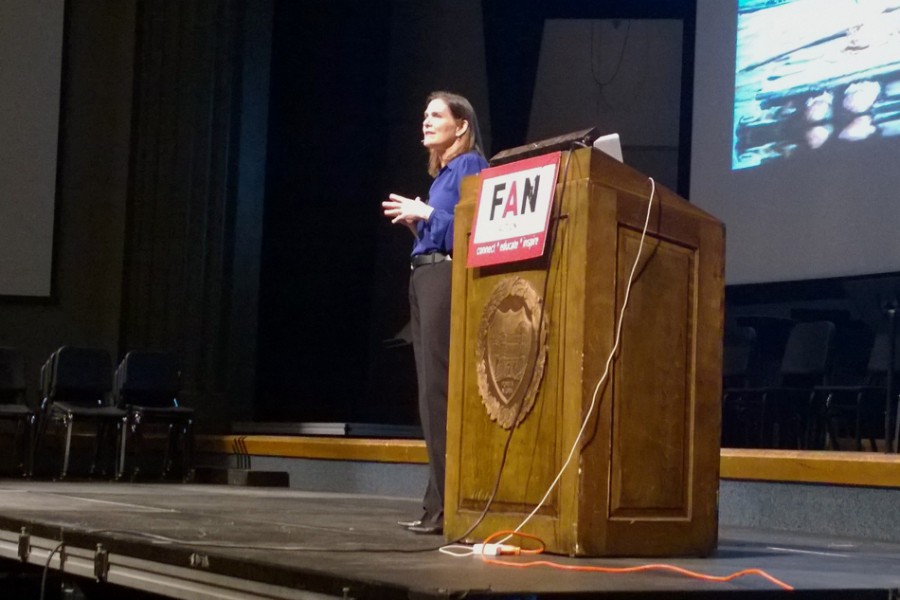Award-winning journalist Brigid Schulte talks overcoming busyness to find happiness
Madeline Fox/The Daily Northwestern
Award-winning journalist and author Brigid Schulte urges an audience of about 200 to reassess how they think about time. Schulte spoke about her book, “Overwhelmed: Work, Love and Play When No One Has the Time” at an event co-sponsored by the Women’s Center.
May 12, 2015
Award-winning Washington Post reporter and author Brigid Schulte urged people to prioritize their happiness and use their time more consciously in a speech Monday at New Trier High School sponsored in part by the Women’s Center at Northwestern.
Schulte said she began looking into why Americans struggle with leisure time after a time-use researcher identified nearly 30 hours of leisure time per week in her schedule she was not enjoying. She told an audience of about 200 to “flip your to-do list” and do the things that make them feel content first.
“You cannot manage time, but what you can manage are your priorities and your expectations,” Schulte said. “The decisions you make for what to do with your time … that’s what adds up to what your life is in the end.”
Schulte’s talk was hosted by the Family Action Network, a local organization that puts on a free public speaker series at Northwestern and other area schools. The speech was held in partnership with the Women’s Center. Schulte was the final speaker in this year’s human development speaker series, which began in September.
Lonnie Stonitsch, the executive director of the Family Action Network, said she became interested in bringing Schulte in to speak after reading her book, “Overwhelmed: Work, Love and Play When No One Has the Time.” Stonitsch said the book, which she read in front of a computer monitor plastered with multicolored sticky-note reminders, hit home for her, and she hoped Schulte’s talk would have a similar effect on the speech’s attendees.
“I hope people will be able to take away some information that will allow them to have the courage to pause,” Stonitsch said. “I’d like them to think about serving themselves.”
The Women’s Center also brought Schulte to campus in October where she talked about moving from “time confetti” to “time serenity,” terms she also highlighted in her Monday night talk.
Schulte also emphasized the importance of play in adult life and said downtime is essential to productivity as well as mental well-being.
“(Imagination) is what distinguishes us as humans,” she said. “Play helps us imagine the future and to imagine what can be possible.”
Another focus of Schulte’s talk was translating this mindset to parenting.
“Kids need just what we need, unstructured time for play,” Schulte said. “You can parent for achievement and you may or may not get happiness, but if you parent for happiness, achievement will come.”
Schulte said researching her book inspired her to change her own practices. She said she wrote the book in 80-90 minute pulses and made time to play.
“I’m a huge believer in breaks now,” she said.
Pediatrician Alma Guzman, who attended the talk, said she particularly liked Schulte’s comments about parenting. Guzman, a child of immigrant parents, said she was pushed toward success, but wants to take Schulte’s “parenting for happiness” approach with her own children.
“I have achieved, but I haven’t really felt as happy sometimes,” said the mother of two. “I don’t want that for my kids.”
Email: [email protected]
Twitter: @MadelineFox14


